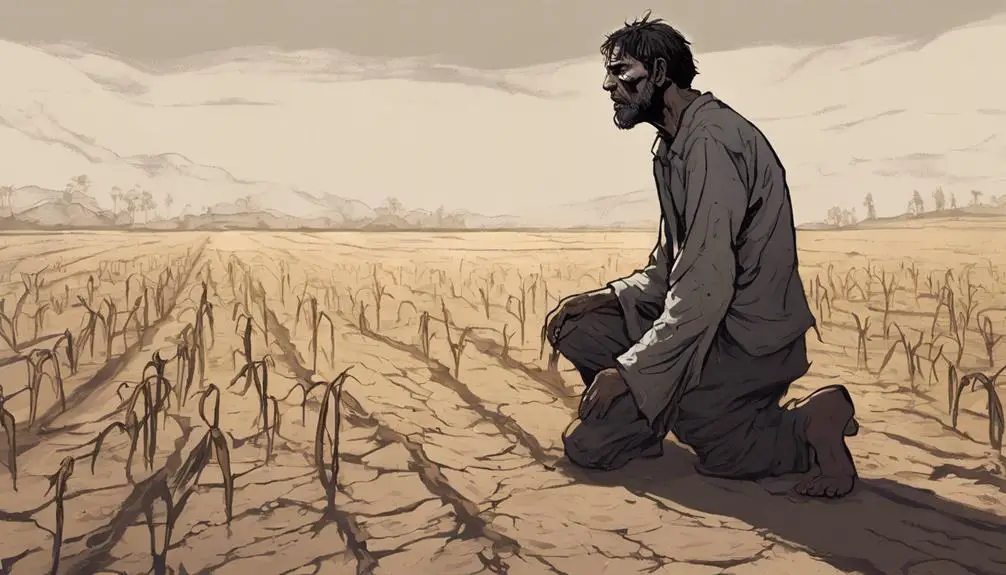Uncover the intricate tales of repentance in the Bible, starting with a journey beyond Adam and Eve's story, to reveal the first heartfelt transformation.

Who Was the First Person to Repent in the Bible
Imagine you're exploring the winding paths of ancient texts, and you stumble upon the concept of repentance in the Bible. You might first think of Adam and Eve, grappling with the aftermath of their disobedience, but their narrative doesn't explicitly capture a moment of repentance.
Then there's Cain, marked by regret yet not quite embodying a heartfelt turn from sin. However, the story that vividly brings repentance to life involves King David, whose profound sorrow and turning back to God set a precedent.
As you ponder who truly was the first to repent, consider the complexities of human nature and divine forgiveness that these narratives unravel, inviting you to explore deeper into the essence of repentance and its implications throughout biblical history.
Key Takeaways
- Adam and Eve's story introduces the concept of human disobedience and the need for repentance.
- Cain's narrative, marked by insincere worship and fratricide, involves divine intervention but lacks genuine repentance.
- King David's sincere acknowledgment of sin and public repentance set a biblical standard for genuine remorse and transformation.
- The first explicit act of repentance involves acknowledging wrongdoing and turning away from sin, as exemplified by King David's actions.
The Concept of Repentance

In the realm of biblical studies, repentance stands as a foundational concept, marked by a profound turning away from sin and toward God, necessitating both recognition of wrongdoing and a deliberate, heartfelt decision to change one's ways. This repentance process is deeply entwined with the understanding of humanity's sinful nature, an inherent condition that separates individuals from divine holiness. You'll find that the scriptures delineate repentance not merely as a one-time event but as a continual, dynamic journey of self-assessment, confession, and transformation.
Analyzing the concept further, it's apparent that repentance involves a complex interplay between divine grace and human agency. You're called to acknowledge your sinful nature, which is no small feat, considering the human propensity to justify or minimize one's faults. This acknowledgment is the first critical step in the repentance process. Following this, a genuine desire to amend one's ways and seek forgiveness signifies a heart moving towards reconciliation with God.
The scholarly lens on repentance underscores its dual nature: it's both a gift from God, enabling individuals to see their actions through divine perspective, and a personal commitment to renounce sin and pursue a life in alignment with God's will. This duality highlights the intricate relationship between divine sovereignty and human responsibility in the journey of spiritual growth.
Adam and Eve's Disobedience
Reflecting on the concept of repentance brings us directly to the pivotal moment of Adam and Eve's disobedience, where humanity's journey with sin and the need for repentance first began. This narrative, deeply embedded within the Genesis account, showcases the immediate fallout from their actions, underpinned by the Serpent's deception, and unfolds the garden consequences that resonate through biblical history.
- Serpent's Deception: The serpent, a cunning creature, tempted Eve by distorting the truth of God's command, leading to a catastrophic shift in humanity's relationship with their Creator.
- The Act of Disobedience: Yielding to the temptation, Adam and Eve ate from the Tree of Knowledge, an act of direct defiance against God's explicit command, marking the inception of sin in the human narrative.
- Garden Consequences: Their actions had immediate and profound effects: spiritual separation from God, a curse upon the earth and its inhabitants, and eventual physical banishment from Eden.
This incident not only highlights the frailty and susceptibility of human nature to sin but also sets the stage for the profound need for repentance and redemption. It offers a foundational understanding of the human condition, emphasizing the critical role of obedience and the devastating impact of sin.
Cain's Regret and Punishment

Following Adam and Eve's transgression, the narrative of repentance in the Bible unfolds further with Cain, whose actions and subsequent punishment deepen our understanding of sin's consequences and the complexity of human remorse. Cain's offering to God, unlike Abel's, lacks the sincerity and righteousness that marked his brother's sacrifice. This discrepancy between the brothers not only highlights the importance of the heart's condition in worship but also sets the stage for Cain's ensuing jealousy and ultimate act of fratricide.
The rejection of Cain's offering, therefore, isn't merely about the material aspects but rather the manifestation of an unrighteous heart, contrasting sharply with Abel's righteousness. When Cain's anger leads to Abel's murder, it marks a pivotal moment where personal sin escalates into communal consequences, illustrating the destructive power of unchecked jealousy and resentment.
Cain's punishment by God, which includes exile and wandering, isn't just a punitive measure but also a divine intervention aimed at awakening Cain to the severity of his actions. Yet, Cain's response, marked by fear of retribution rather than true repentance, underscores a complex interplay between divine justice, human sinfulness, and the elusive nature of genuine remorse.
The Case of King David
Moving from Cain's complex interplay of sin and remorse, we now explore the profound narrative of King David, whose repentance sets a benchmark for genuine contrition in the Bible. Unlike the murky repentance of Cain, David's story offers a clear, unambiguous model of acknowledging one's sins and seeking forgiveness.
David's Bathsheba affair marks a pivotal moment, not only in his reign but in the biblical discourse on sin and redemption. Here's why David's story captivates and teaches:
- Immediate Acknowledgment: Upon being confronted by Nathan the prophet, David doesn't deflect or deny. He owns up to his actions swiftly and unequivocally.
- Public Repentance: David's repentance isn't a private affair. He expresses his sorrow publicly, setting an example of humility and accountability.
- Transformation: Post repentance, David's actions show a clear shift, moving away from the sins that ensnared him, highlighting the transformative power of genuine remorse.
This narrative starkly contrasts with Saul's jealousy-driven pursuits, where repentance is fleeting or altogether absent. David's approach to his transgressions teaches the importance of facing one's misdeeds head-on, embracing the discomfort of acknowledgment, and the necessity of a heartfelt apology for real change to occur.
Lessons in Divine Forgiveness

Understanding divine forgiveness in the biblical context requires a deep dive into the narratives that showcase God's capacity for mercy and the conditions under which it is granted. The grace dynamics within these stories reveal much about the nature of forgiveness and its profound impact on both the individual and the community.
Grace Dynamics |
Forgiveness Impact |
Emotional Evocation |
|---|---|---|
Unmerited Favor |
Transformation |
Hope |
Repentance |
Reconciliation |
Relief |
Mercy |
Renewal |
Gratitude |
Obedience |
Restoration |
Peace |
Humility |
Empowerment |
Inspiration |
These elements paint a detailed picture of how divine forgiveness operates. It's not merely about the erasure of wrongdoing but involves a transformative process that changes individuals fundamentally. Through repentance and humility, one becomes a vessel for mercy, leading to personal renewal and the restoration of relationships. The impact of forgiveness extends beyond the individual, fostering reconciliation and harmony within the community.
Analyzing these instances, you'll find that forgiveness is both a divine prerogative and a human necessity. It's a powerful force that can mend the deepest of rifts, offering hope and peace where there was once despair and turmoil. Understanding this can inspire you to seek and extend forgiveness, recognizing its unparalleled capacity to heal and empower.
Frequently Asked Questions
How Does the Concept of Repentance Differ Across Various Religious Texts Outside the Bible?
You'll find that repentance varies significantly across religions.
In Islam, tawbah involves a personal plea to God for forgiveness, emphasizing direct communication with the divine.
Hinduism's approach, prayaścitta, incorporates specific rituals or acts of penance to rectify wrongdoing, focusing on actions that cleanse one's karma.
Both concepts share the underlying goal of moral realignment but differ in execution, reflecting broader philosophical differences about individual responsibility and divine interaction.
Are There Examples of Collective Repentance by a Group or Nation in Historical Records or Other Religious Texts?
You're diving into a sea of history and spirituality, seeking gems of national remorse and collective transformation. Examples of entire communities or nations repenting aren't just myths; they're documented across various civilizations and religious texts.
This concept reflects a profound, shared awakening towards moral and ethical rejuvenation. Analyzing these instances reveals patterns of collective repentance, showcasing how societies have historically recognized their faults and sought to amend them through unified, transformative actions.
How Has the Interpretation of Repentance Evolved Within Christian Theology From the Early Church to Modern Times?
In Christian theology, the evolution of repentance's interpretation is quite fascinating. Early interpretations often emphasized strict penance and moral transformation, viewing repentance as a profound, internal change.
As you move toward modern perspectives, there's a shift towards understanding repentance as a relational dynamic, focusing on God's grace and forgiveness. This evolution reflects broader theological shifts, from a focus on individual sinfulness to an emphasis on communal reconciliation and divine love.
In What Ways Do Contemporary Psychological Theories Intersect With the Biblical Notion of Repentance?
You're exploring how contemporary psychological theories intertwine with the biblical concept of repentance.
Psychological healing and emotional transformation are central to both fields.
Modern psychology delves into the mechanisms of change and healing, paralleling biblical narratives of repentance which emphasize a transformative journey.
This intersection offers a rich analysis, suggesting that both disciplines contribute to understanding human behavior and the profound process of turning towards a new direction in life.
Can the Act of Repentance in the Bible Be Connected to Modern Concepts of Restorative Justice and Reconciliation Practices?
You might find that the act of repentance in the Bible does indeed resonate with modern concepts of restorative justice and reconciliation practices.
This connection emphasizes the role of repentance not just in personal transformation but also in facilitating legal reforms and societal healing.
Analyzing this link can offer insightful perspectives on how ancient practices are foundational to contemporary efforts towards creating more equitable and empathetic legal and social systems.
Conclusion
Conclusively, the narrative of repentance in the Bible unfolds with profound complexity, weaving through tales of human frailty and divine mercy.
You've journeyed from the Garden of Eden, where repentance was a silent echo, to the palpable remorse of Cain, and ultimately to the poignant contrition of King David.
Each story reveals layers of spiritual insight, beckoning you to ponder deeper truths about repentance's power and its pivotal role in our relationship with the divine.
This exploration, rich in scholarly detail, invites a reflective pause, urging you to consider the transformative potential of true repentance in the tapestry of faith.



Sign up